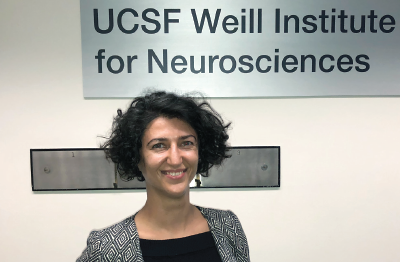Mentors Help Psychiatry Resident Achieve Her Dream
Abstract
The experience of Bulgarian-born psychiatrist Stefana Morgan, M.D., demonstrates why established psychiatrists should serve as mentors to medical students and residents.
Stefana Morgan, M.D., a fourth-year psychiatry resident at the University of California, San Francisco (UCSF), studies how personality affects psychological outcomes in cancer patients. Her work at UCSF fulfills a lifelong ambition.

Stefana Morgan, M.D., remains inspired by the strong women in her family and is grateful for the training and support that her mentors have given her to help her succeed in this country.
Born in 1981, Morgan witnessed Bulgaria’s democratic transition as a teenager, which she said inspired her interest in human behavior. In high school she decided she wanted to train to become a psychiatrist in the United States.
When she first arrived in this country, Morgan struggled to gain her footing. The upside was that being on her own for the first time made her realize the importance of networking—or, as she said, “essentially building my own family or community.”
“I learned by necessity. Many times I didn’t reach out because I felt shy, but I realized that people are happy to help.”
After receiving her B.S. from Eckerd College in St. Petersburg, Fla., she was admitted to the University of Michigan Medical School (UMMS).
It was there that she met Michelle Riba, M.D., M.S. Riba, a past APA president, is a clinical professor and program director of the Psychosomatic Medicine Fellowship at the University of Michigan, where she is also director of the Comprehensive Depression Center and director of the PsychOncology Program at the Comprehensive Cancer Center.
In her first year at UMMS, Morgan was paired with Riba through an American Medical Women’s Association mentorship program. “I told her my story, and she was supportive from the beginning,” Morgan said.
Riba told Psychiatric News that she was captivated by Morgan’s background and enthusiasm. “She came here on her own. She had to fend for herself without family or friends while coping with the language issue,” she said. “She is an example of how we need to think about some of our international students and the hardships they face.”
Meanwhile, Morgan’s family had immigrated to the United States and was living in San Francisco. When her grandfather was diagnosed with terminal lung cancer in her third year of medical school, Morgan’s impulse was to take a year off to spend time with him.
Instead, Riba recommended that Morgan consider other options, such as doing a fellowship in San Francisco so she could continue her career while being close to her family. She put Morgan in touch with Laura Dunn, M.D., a geriatric psychiatrist who was conducting psycho-oncology research at UCSF.
“People need different types of mentors in their professional life,” Riba said, noting that each mentee’s needs are different and vary throughout his or her career. “I understood the importance of her being there for her family,” Riba said. “I connected her [with Dunn], believing it would be a good handoff.”
Dunn was impressed with Morgan’s willingness to take on many projects and felt they would work well together as mentor and mentee.
Although Dunn liked Morgan personally, Morgan had to prove herself professionally.
“She had to do the work. When she delivered on her end, I became confident in her abilities.”
Morgan began a research fellowship at UCSF, splitting her time working for Dunn and Judy Moskowitz, Ph.D., a stress and coping researcher at the UCSF Osher Center of Integrative Medicine.
In the end, Morgan was able to complete her M.D. without going back to Michigan.
“Stefana has the ability to network and utilize her mentors in a variety of ways to meet other mentors,” said Dunn in an interview. “This quality has served her well.”
Dunn encourages her mentees to attend national psychiatry meetings, join professional groups, and make presentations. Of her relationship with Morgan, she said, “What we both value is that I don’t try to shape her into my vision of what I think she should do in her career. I’m trying to help her find what she is passionate about.”
Dunn said it is also important for new psychiatrists to learn to say no. “Even if a project seems exciting, it is important to determine the best use of your time.”
Morgan worked on five clinical research projects related to cancer and cancer survivors while caring for her grandfather—a way to combine her personal and professional interests. He died in February 2014, one month before Morgan was accepted for an adult psychiatry residency at UCSF.
“All these women taught me to follow my passions. I have a lot of options, and the only way to figure out which way to go—outpatient, inpatient, or research—is by listening to what I’m passionate about.”
Riba added that senior psychiatrists “pay it forward” through mentorship. “You learn from the people who helped you, and you want to give back to others,” she said. ■



